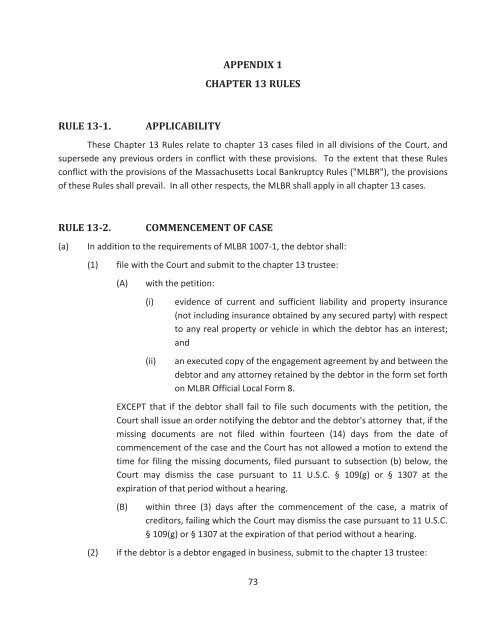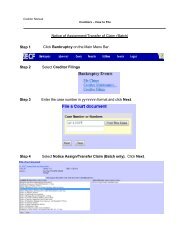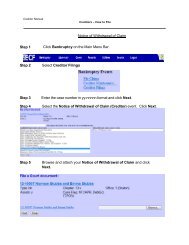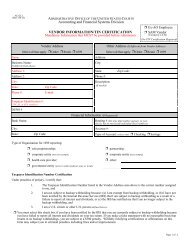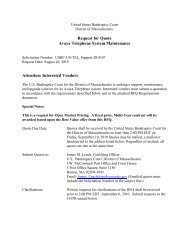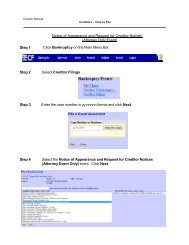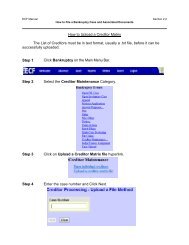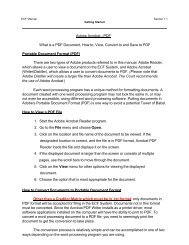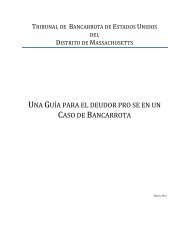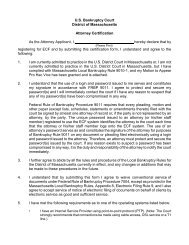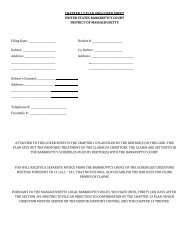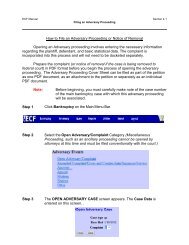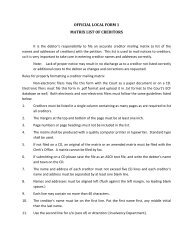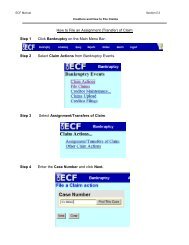Appendix 1 - Chapter 13 Rules
Appendix 1 - Chapter 13 Rules
Appendix 1 - Chapter 13 Rules
You also want an ePaper? Increase the reach of your titles
YUMPU automatically turns print PDFs into web optimized ePapers that Google loves.
APPENDIX 1<br />
CHAPTER <strong>13</strong> RULES<br />
RULE <strong>13</strong>-1.<br />
APPLICABILITY<br />
These <strong>Chapter</strong> <strong>13</strong> <strong>Rules</strong> relate to chapter <strong>13</strong> cases filed in all divisions of the Court, and<br />
supersede any previous orders in conflict with these provisions. To the extent that these <strong>Rules</strong><br />
conflict with the provisions of the Massachusetts Local Bankruptcy <strong>Rules</strong> ("MLBR"), the provisions<br />
of these <strong>Rules</strong> shall prevail. In all other respects, the MLBR shall apply in all chapter <strong>13</strong> cases.<br />
RULE <strong>13</strong>-2. COMMENCEMENT OF CASE<br />
(a) In addition to the requirements of MLBR 1007-1, the debtor shall:<br />
(1) file with the Court and submit to the chapter <strong>13</strong> trustee:<br />
(A)<br />
with the petition:<br />
(i)<br />
(ii)<br />
evidence of current and sufficient liability and property insurance<br />
(not including insurance obtained by any secured party) with respect<br />
to any real property or vehicle in which the debtor has an interest;<br />
and<br />
an executed copy of the engagement agreement by and between the<br />
debtor and any attorney retained by the debtor in the form set forth<br />
on MLBR Official Local Form 8.<br />
EXCEPT that if the debtor shall fail to file such documents with the petition, the<br />
Court shall issue an order notifying the debtor and the debtor's attorney that, if the<br />
missing documents are not filed within fourteen (14) days from the date of<br />
commencement of the case and the Court has not allowed a motion to extend the<br />
time for filing the missing documents, filed pursuant to subsection (b) below, the<br />
Court may dismiss the case pursuant to 11 U.S.C. § 109(g) or § <strong>13</strong>07 at the<br />
expiration of that period without a hearing.<br />
(B)<br />
within three (3) days after the commencement of the case, a matrix of<br />
creditors, failing which the Court may dismiss the case pursuant to 11 U.S.C.<br />
§ 109(g) or § <strong>13</strong>07 at the expiration of that period without a hearing.<br />
(2) if the debtor is a debtor engaged in business, submit to the chapter <strong>13</strong> trustee:<br />
73
(A)<br />
within seven (7) days after the commencement of the case:<br />
(i)<br />
(ii)<br />
evidence of current and sufficient business insurance; and<br />
evidence that appropriate debtor-in-possession checking accounts<br />
were opened at the time of the filing of the petition;<br />
(B)<br />
(C)<br />
within fourteen (14) days after the commencement of the case, a profit and<br />
loss statement for the calendar year or fiscal year, whichever is applicable,<br />
preceding the year in which the case is filed, and a profit and loss statement<br />
for the period from the end of the calendar or fiscal year to the date of the<br />
filing of the petition; and<br />
within thirty (30) days of the close of each quarter, a statement of quarterly<br />
income and expenses incurred.<br />
(b)<br />
(c)<br />
Any motion requesting an extension of time to file documents required under this Rule<br />
shall be filed before the expiration of the filing deadline, shall set forth the specific cause<br />
for the request, the amount of additional time requested and the date the petition was<br />
filed, and shall include a certificate of service evidencing that the motion was served on the<br />
chapter <strong>13</strong> trustee.<br />
Any motion to amend a voluntary petition or statement shall be served upon all parties<br />
affected by the amendment and the chapter <strong>13</strong> trustee. The motion and proposed<br />
amendment shall be accompanied by a certificate of service identifying those parties<br />
served. A motion to amend to add a creditor to the debtor's schedules shall be served<br />
upon the creditor being added and the chapter <strong>13</strong> trustee. An amendment adding a<br />
creditor or party in interest shall be accompanied by 1) the fee prescribed by the<br />
Administrative Office of the United States Courts, if applicable, and 2) an amended matrix<br />
including the names and addresses of the added parties.<br />
RULE <strong>13</strong>-3.<br />
DISCLOSURE OF RELATED CASES<br />
[Deleted] (Included in Rule 1007-1, incorporated by reference in <strong>Appendix</strong> 1, Rule <strong>13</strong>-2(a)).<br />
RULE <strong>13</strong>-4.<br />
(a)<br />
Form of Plan<br />
CHAPTER <strong>13</strong> PLAN<br />
A chapter <strong>13</strong> plan shall conform to MLBR Official Local Form 3, with such alterations as may<br />
be appropriate to suit the circumstances.<br />
74
(b)<br />
Service of Plan<br />
Concurrently with the filing of the plan, the debtor or the debtor's attorney shall cause a<br />
copy of the plan to be served by first class mail upon the chapter <strong>13</strong> trustee, all creditors of<br />
the debtor, all attorneys who have filed appearances and requested service of all<br />
pleadings, and other parties in interest. The debtor or his attorney shall file with the plan a<br />
certificate of service.<br />
(c)<br />
If a debtor proposes payments to creditors over a period that exceeds three (3) years, the<br />
debtor shall set forth in the plan the reasons for such longer payment period.<br />
RULE <strong>13</strong>-5.<br />
SERVICE OF MOTIONS<br />
All motions and requests for orders must be served on the chapter <strong>13</strong> trustee, the debtor,<br />
the debtor's attorney, persons who have filed appearances and requested service of all pleadings,<br />
and all creditors with the following exceptions:<br />
(a)<br />
(b)<br />
(c)<br />
(d)<br />
a motion for relief from the automatic stay shall be served on the debtor, the debtor's<br />
attorney, and all persons with an interest in or lien on the subject collateral;<br />
a chapter <strong>13</strong> trustee's motion to dismiss shall be served on the debtor and the debtor's<br />
attorney;<br />
a debtor's motion to dismiss or notice of conversion to chapter 7 or 11 when there have<br />
been no prior conversions shall be served on the chapter <strong>13</strong> trustee;<br />
objections to claims shall be served on the chapter <strong>13</strong> trustee, the claimant, and the<br />
claimant's attorney; and<br />
(e) objections to confirmation shall be served in accordance with paragraph <strong>13</strong>-8.<br />
RULE <strong>13</strong>-6.<br />
(a)<br />
ATTORNEYS<br />
An attorney who represents a debtor at the time a chapter <strong>13</strong> case is commenced or when<br />
a case under another chapter of the Bankruptcy Code is converted to chapter <strong>13</strong> has a<br />
continuing duty to represent the debtor in all matters, including the § 341 meeting and<br />
court hearings, until the occurrence of the earliest of the following:<br />
(1) dismissal of the case;<br />
(2) closing of the case; or<br />
75
(3) the entry of an order allowing the attorney to withdraw from further<br />
representation of the debtor.<br />
(b)<br />
(c)<br />
If an attorney for a debtor is unable to contact the debtor in connection with any matter,<br />
the attorney shall file a statement informing the Court of this fact, which statement shall<br />
include the efforts the attorney has made to contact the debtor. The attorney shall serve a<br />
copy of the statement on the debtor at his or her last known address.<br />
The chapter <strong>13</strong> trustee or a representative of the chapter <strong>13</strong> trustee shall be present at any<br />
hearing held in a chapter <strong>13</strong> case, unless excused for cause prior to the hearing.<br />
RULE <strong>13</strong>-7.<br />
(a)<br />
PROFESSIONAL FEES; PREPETITION RETAINERS<br />
Prepetition Retainers. The amount of any retainer received by debtor's counsel shall be<br />
included in the Statement of Attorney Compensation filed pursuant to Fed. R. Bankr. P.<br />
2016(b).<br />
(b)<br />
(c)<br />
(d)<br />
Unless otherwise ordered by the Court, if debtor's attorney's total compensation prior to<br />
confirmation of a plan is $3,500 or less, the disclosure of the compensation in the Rule<br />
2016(b) Statement shall be sufficient notwithstanding compensation for post confirmation<br />
services in an amount not exceeding $500, and the filing of an itemized application for<br />
compensation shall be excused, unless the Court orders otherwise.<br />
Application for Additional Attorney's Fees. An attorney who proposes to charge a debtor<br />
more than $3,500 in the aggregate for legal services in a chapter <strong>13</strong> case prior to<br />
confirmation, or $500 in the aggregate for such services after confirmation, shall file an<br />
application for compensation in accordance with Fed. R. Bankr. P. 2016 and MLBR 2016-1.<br />
Unless otherwise ordered by the Court, debtor's attorney shall serve a copy of the<br />
application on all creditors, parties requesting service of all pleadings, and the chapter <strong>13</strong><br />
trustee and shall file a certificate of service to that effect with the application. If no<br />
objections are filed within twenty-one (21) days of service, the Court shall award fees in its<br />
discretion, with or without a hearing, in accordance with applicable law.<br />
Nothing in this Rule shall be construed to limit the Court's discretion to review the amount<br />
of fees paid to or agreed to be paid to a debtor's attorney, and to enter appropriate orders<br />
allowing, disallowing, or reducing such attorney's fees.<br />
RULE <strong>13</strong>-8. OBJECTIONS TO CONFIRMATION<br />
(a) Deadline for Filing<br />
76
Unless otherwise ordered by the Court, any objection to confirmation of a chapter <strong>13</strong> plan<br />
shall be filed on or before the later of (i) thirty (30) days after the date on which the first<br />
§ 341 meeting is held or (ii) thirty (30) days after service of an amended or modified plan.<br />
(b)<br />
Service of Objection<br />
An objection to confirmation shall be filed with the Court and served on the chapter <strong>13</strong><br />
trustee, the debtor, the debtor's attorney, and any other party or attorney who has filed an<br />
appearance and requested service of pleadings. The objection shall be accompanied by a<br />
certificate of service evidencing compliance with this requirement.<br />
(c)<br />
(d)<br />
(e)<br />
Unless otherwise ordered by the Court, any response to the objection must be filed within<br />
fourteen (14) days after service of the objection. If no response is filed, the Court may<br />
sustain the objection without further hearing.<br />
Following the filing of any response to an objection to confirmation, counsel to the debtor<br />
or a pro se debtor shall confer with counsel to the objecting party, either in person or by<br />
telephone conference, to make a good faith effort to resolve or narrow disputes as to the<br />
contents of an objection to confirmation. The objecting party shall be responsible for<br />
initiating the conference by telephone, fax, email, first class mail, or in person. Counsel to<br />
an objecting party does not violate the automatic stay by contacting the pro se debtor in<br />
complying with the requirements of this Rule. Such communication shall be for the<br />
purpose of initiating the conference only, and the conference must be held either in<br />
person or by telephone.<br />
No later than twenty-one (21) days after the response to an objection to confirmation is<br />
filed, the objecting party shall file a certificate stating either (i) that the conference was<br />
held, the date of the conference, and the names of the participating parties; or (ii) that the<br />
conference was not held despite timely and reasonable efforts made to initiate the<br />
conference, which efforts must be set forth with specificity in the certificate. The Court<br />
will not schedule a hearing on an objection to confirmation until the objecting party files<br />
the certificate. In the event the parties do not hold the required conference, the Court<br />
may order appropriate sanctions, including sustaining or overruling the objection to<br />
confirmation or awarding monetary sanctions. The requirement of a conference shall not<br />
apply in the event the Court determines that expedited or emergency consideration of the<br />
objection to confirmation is warranted.<br />
77
RULE <strong>13</strong>-9.<br />
(a)<br />
SECTION 341 MEETING OF CREDITORS<br />
The Clerk shall serve on all creditors notice of the § 341(a) meeting of creditors and initial<br />
confirmation hearing date along with a proof of claim form in accordance with Fed. R.<br />
Bankr. P. 2002(a) and 2003(a).<br />
(b)<br />
If the debtor fails to appear at the § 341 meeting, the case may be dismissed upon motion<br />
of a party in interest pursuant to 11 U.S.C. § 109(g).<br />
(c) The debtor shall file tax returns in accordance with the provisions of 11 U.S.C. § <strong>13</strong>08.<br />
When the tax return is filed, the debtor shall file with the Clerk and serve on the chapter <strong>13</strong><br />
trustee a notice of the filing of the return, which shall disclose the amount of the tax<br />
liability or the amount of the refund.<br />
RULE <strong>13</strong>-10.<br />
(a)<br />
AMENDMENTS TO PLAN PRIOR TO CONFIRMATION<br />
Amendments to a plan which do not adversely affect creditors may be made at or prior to<br />
the § 341(a) meeting without leave of the Court by a separate pleading entitled<br />
"Modification of Plan," which shall be filed with the Court and served on the chapter <strong>13</strong><br />
trustee and any party or attorney who has filed an appearance and requested service of<br />
pleadings in the case. The modification shall be accompanied by a certificate of service. If<br />
no objections to the modification are filed within fourteen (14) days after service, the<br />
Court shall consider confirmation of the plan as amended.<br />
(b)<br />
Where an amendment to a plan adversely affects creditors, the debtor shall file with the<br />
Court an amended plan and a motion to approve the amended plan. The debtor shall<br />
serve a copy of the amended plan and motion to approve the amended plan on the<br />
chapter <strong>13</strong> trustee, all creditors, and all parties and attorneys who filed appearances and<br />
requested service of all pleadings in the case. The motion shall be accompanied by a<br />
certificate of service. If no objections to the motion to approve the amended plan or the<br />
amended plan are filed within thirty (30) days of the filing of the certificate of service, the<br />
Court may allow the motion without a hearing.<br />
RULE <strong>13</strong>-11.<br />
(a)<br />
CONFIRMATION<br />
Where no objection to confirmation of a chapter <strong>13</strong> plan is filed within the time limits<br />
established by paragraph <strong>13</strong>-8(a) of this order, the Court may enter an order confirming<br />
the plan without a hearing.<br />
78
(b)<br />
(c)<br />
Where a timely objection to a chapter <strong>13</strong> plan is filed, the Court shall hold a hearing on the<br />
objection. The Clerk shall schedule a confirmation hearing and advise the objecting party<br />
and/or its counsel of the hearing date. The objecting party shall provide notice of the<br />
confirmation hearing to the debtor, debtor's counsel, all creditors, interested parties, and<br />
all parties who filed appearances and requested service of all pleadings, and shall file a<br />
certificate of service regarding the notice of the hearing.<br />
The chapter <strong>13</strong> trustee shall submit a proposed order of confirmation to the Court in<br />
conformity with MLBR Official Local Form 4 within twenty-one (21) days after the later of<br />
1) the Court's order overruling any objection to confirmation; 2) the withdrawal of an<br />
objection to confirmation; or 3) in the event that there are no objections to confirmation,<br />
the deadline for filing objections to confirmation. The chapter <strong>13</strong> trustee shall attach a<br />
copy of the plan to the proposed order of confirmation. The chapter <strong>13</strong> trustee shall serve<br />
a copy of the proposed order of confirmation on the debtor's attorney, the debtor, and all<br />
parties and attorneys who have filed appearances and requested service of pleadings in<br />
the case.<br />
RULE <strong>13</strong>-12.<br />
(a)<br />
AMENDMENTS TO PLAN AFTER CONFIRMATION<br />
A debtor who seeks to amend a chapter <strong>13</strong> plan after confirmation shall do so by filing a<br />
motion to amend the plan with a copy of the proposed amended plan (filed as a separate<br />
document). The motion to amend shall include a summary and statement of the reason<br />
for the amendment. In conjunction with the motion to amend, the debtor shall file<br />
updated schedules I and J if plan payments are changing under the terms of the amended<br />
plan. The chapter <strong>13</strong> trustee, in his or her discretion, may schedule a new § 341 meeting<br />
with respect to the amended plan.<br />
(b)<br />
(c)<br />
(d)<br />
The debtor shall serve a copy of the motion, amended plan, updated schedules I and J, and<br />
the amended statement on the chapter <strong>13</strong> trustee, all creditors, and parties and attorneys<br />
who have filed appearances and requested service of pleadings in the case. In the event<br />
that the debtor proposes more than one amended plan, each amended plan shall be titled<br />
"First Amended Plan," "Second Amended Plan," and so on as may be appropriate.<br />
The Court shall not consider any amendments to a plan unless they are set forth in an<br />
amended plan that conforms to MLBR Official Local Form 3A.<br />
Approval of an amended plan after confirmation of a prior plan may be granted without a<br />
hearing if no objections are timely filed. Objections to an amended plan shall be filed no<br />
later than thirty (30) days from the date of service of the motion to amend. In the event<br />
that no objections to the motion are timely filed, the Court may, in its discretion, allow the<br />
79
motion to amend without a hearing. If a party in interest files a timely objection to the<br />
motion, the Court shall set the motion and objection for hearing. The objecting party shall<br />
serve a notice of hearing on the debtor, debtor's counsel, all creditors, the chapter <strong>13</strong><br />
trustee, and all parties who filed appearances and requested service of pleadings at least<br />
seven (7) days before the hearing date, and shall file a certificate of service.<br />
(e)<br />
The trustee shall submit a proposed order confirming an amended plan in conformity with<br />
MLBR Official Local Form 4 within twenty-one (21) days after the Court allows the motion<br />
to amend the plan. The chapter <strong>13</strong> trustee shall attach a copy of the amended plan to the<br />
proposed order of confirmation. The chapter <strong>13</strong> trustee shall serve a copy of the proposed<br />
order confirming an amended plan on the debtor, debtor's attorney, and all parties and<br />
attorneys who have filed appearances and requested service of pleadings in the case.<br />
RULE <strong>13</strong>-<strong>13</strong>.<br />
(a)<br />
PROOFS OF CLAIM AND OBJECTIONS<br />
All creditors must timely file a proof of claim that conforms with Official Form B10 to<br />
participate in distributions under the plan. If the claim relates to a mortgage or security<br />
agreement, the creditor shall attach a copy of the original note and mortgage or security<br />
agreement to the proof of claim. If the claimant is not the original holder of the note and<br />
mortgage or security agreement, in addition to attaching copies of the original note,<br />
mortgage or security agreement to the proof of claim, the creditor shall attach copies of<br />
any and all assignments or other appropriate documentation sufficient to trace the chain<br />
of ownership of the mortgage or security agreement and to establish its standing to assert<br />
the claim.<br />
(b)<br />
(c)<br />
A creditor whose proof of claim relates to a mortgage or security agreement shall set forth<br />
a detailed itemization of all amounts asserted to be due. The itemization shall set forth the<br />
principal, interest, costs, and all expenses charged under the agreement or statute under<br />
which the claim arose, including but not limited to expenses of any notices, foreclosure<br />
sales, advertisements and/or appraisals. The itemization shall also include a statement of<br />
attorneys’ fees charged as an accounting of the amount of the prepetition arrearage. The<br />
Court, in its discretion, may order a claimant or a claimant’s attorney to file an application<br />
for compensation and reimbursement of expenses in accordance with MLBR 2016-1 or an<br />
accounting of the amount of any prepetition arrearage.<br />
Only the provisions of MLBR 3007-1(a), (c), (d) and (f) apply to chapter <strong>13</strong> cases. A party<br />
objecting to claims shall attach a notice to the objection filed with the Court, which shall<br />
advise claimant(s) that a response to the objection must be filed within 30 days of the filing<br />
of the objection with the Court. The objecting party shall serve the objection and the<br />
80
notice on the claimant at the address noted on the proof of claim or any subsequent<br />
address provided to the Court by the claimant and upon any other party entitled to notice<br />
together with a certificate of service.<br />
(d)<br />
(e)<br />
(f)<br />
Within seven (7) days after filing a response to an objection to a proof of claim, the<br />
objecting party (whether the trustee, counsel to the debtor, or a pro se debtor) shall<br />
confer with counsel to the claimant, either in person or by telephone conference to make a<br />
good faith effort to resolve or narrow disputes as to the contents of the objection to claim.<br />
Counsel to the objecting party, the chapter <strong>13</strong> trustee or the pro se debtor shall be<br />
responsible for initiating the conference by telephone, facsimile, email, first class mail, or<br />
in person. Such communications shall be for the purposes of initiating the conference<br />
only, and the conference must be held either in person or by telephone. The Court shall<br />
not schedule a hearing on an objection to claim unless counsel to the objecting party or a<br />
pro se debtor files a certificate stating that the conference was held, together with the<br />
date and time of the conference, and the names of the participating parties. If the<br />
conference is not held despite timely efforts to initiate the conference, the party initiating<br />
the conference must file a statement attesting to the efforts made to initiate the<br />
conference. In the event the parties do not hold the required conference, the Court may<br />
order appropriate sanctions, including sustaining or overruling the objection to claim or<br />
awarding monetary sanctions. The requirement of a conference shall not apply in the<br />
event the Court determines that expedited or emergency consideration of the objection to<br />
claim is warranted.<br />
Objections to claims shall be served and filed with the Court within thirty (30) days after<br />
the deadline for filing proofs of claim or within such additional time as the Court may allow<br />
upon the filing of a motion to extend time and for good cause shown. Any claim to which a<br />
timely objection is not filed shall be deemed allowed and paid by the chapter <strong>13</strong> trustee in<br />
accordance with the provisions of the confirmed plan. The Court, in its discretion, may<br />
overrule an untimely objection to a proof of claim.<br />
If the Court has determined the allowed amount of a secured or unsecured claim in the<br />
context of a valuation hearing pursuant to 11 U.S.C. § 506, the debtor or trustee need not<br />
file an objection to a secured creditor's proof of claim that varies from the Court's<br />
determination, and the chapter <strong>13</strong> trustee shall make distribution in accordance with the<br />
Court's order.<br />
81
RULE <strong>13</strong>-14.<br />
(a)<br />
SALE OF ESTATE PROPERTY<br />
Any sale of the property of the estate outside the ordinary course of business, including<br />
but not limited to, the debtor's principal residence, real property, or other property must<br />
be approved by the Court after notice and a hearing. A motion for such approval shall be<br />
made in accordance with 11 U.S.C. § 363, Fed. R. Bankr. P. 4001 or 6004, and MLBR 6004-1,<br />
as applicable, and the notice of sale shall conform to MLBR Official Local Form 2A. The<br />
motion to sell shall include a proposed distribution of the proceeds of the sale. All motions<br />
to sell shall be served on the chapter <strong>13</strong> trustee, all creditors, all parties who have filed<br />
appearances and any other entity as the Court may direct.<br />
(b)<br />
(c)<br />
If an appraiser or real estate broker is involved in the sale, the debtor must obtain Court<br />
authority to employ the appraiser or broker by way of motion. The motion must be<br />
accompanied by an affidavit of disinterestedness signed by the broker and comply with the<br />
requirements of MLBR 2014(a)-1 and 6005-1.<br />
Within forty-five (45) days after the entry of an order approving a private sale of real estate<br />
which is property of the estate, the chapter <strong>13</strong> debtor's attorney or the debtor (if the<br />
debtor is unrepresented), shall file with the Court a "Status Report Regarding Sale of Estate<br />
Property” (the "Report"). The Report shall contain the following information: 1) the date<br />
of the closing of the sale, or if no closing has been held as of the date of the Report, the<br />
reasons for delay in the closing of the sale; 2) a detailed itemization of the disbursements<br />
made at the closing, or in the alternative, the Report shall attach as an exhibit a copy of the<br />
executed settlement statement for the closing of the sale. The closing attorney and the<br />
debtor's attorney (or the debtor, if the debtor is unrepresented) shall ensure compliance<br />
with the terms of the order of the Court approving the sale.<br />
RULE <strong>13</strong>-15.<br />
BORROWINGS OR REFINANCING OF ESTATE PROPERTY<br />
The provisions and requirements of MLBR 4001-2 shall apply in chapter <strong>13</strong> cases. Any<br />
motion for approval of a borrowing or refinancing shall include all the material terms of the<br />
proposed credit arrangement. A copy of any borrowing agreement shall be attached to the<br />
motion.<br />
RULE <strong>13</strong>-16-1. MOTIONS FOR RELIEF FROM STAY<br />
(a) Pre-filing Conference<br />
82
(1) At least seven (7) days prior to filing a motion for relief from stay, counsel to the<br />
movant shall confer with counsel to the debtor or with the pro se debtor, in person<br />
or by telephone, to make a reasonable, good faith effort to resolve or narrow<br />
disputes as to the contents of the motion. Movant’s counsel shall be responsible<br />
for initiating the conference either by telephone, facsimile, e-mail, or first class mail<br />
or in person. Such communications shall be for the purposes of initiating the<br />
conference only, and the conference must be held either in person or by telephone.<br />
A movant does not violate the automatic stay by contacting the pro se debtor(s) in<br />
complying with this Rule.<br />
(2) If the conference is not held despite timely and reasonable good faith efforts made<br />
by movant to initiate the conference, movant’s counsel shall attest to the efforts<br />
made to initiate the conference with counsel to the debtor or with the pro se<br />
debtor.<br />
(3) All motions for relief from stay shall be accompanied by a certificate stating that<br />
(A)<br />
(B)<br />
the conference was held, together with the date and time of the conference<br />
and the names of the participating parties; or<br />
the conference was not held despite the reasonable efforts made by the<br />
movant’s counsel as set forth in counsel’s attestation.<br />
(4) Motions unaccompanied by a certificate may be denied without prejudice to their<br />
renewal when accompanied by the certificate.<br />
(5) A pre-filing conference is not required if (a) the movant has obtained the debtor’s<br />
assent to the motion prior to the motion being filed with the Court and the motion<br />
so indicates, or (b) the debtor has indicated an intent to surrender the real property<br />
that is the subject of the motion in the debtor’s chapter <strong>13</strong> plan filed with the<br />
Court.<br />
(b)<br />
(c)<br />
Emergency or Expedited Motions<br />
Subsection (a) shall not apply if the movant seeks determination of a motion for relief on<br />
an expedited or emergency basis, provided that the motion shall contain a statement<br />
consistent with the provisions of MLBR 90<strong>13</strong>-1.<br />
Contents of Motion<br />
In addition to the requirements of MLBR 4001-1, and except for motions governed by Local<br />
Rule <strong>13</strong>-16-1(d), a motion for relief from the automatic stay shall provide the following<br />
information:<br />
(1) the date of the filing of the chapter <strong>13</strong> petition;<br />
83
(2) the total amount owed to the moving party;<br />
(3) the date of confirmation of the plan;<br />
(4) the amount of the monthly payment at issue;<br />
(5) the total amount of the post-petition or post-confirmation payments (principal and<br />
interest) in default as of the date of the filing of the motion and the amount due as<br />
of the anticipated date of hearing, and the total amount of any other post-petition<br />
change due or anticipated as of each of these dates;<br />
(6) the total amount of the prepetition arrearage;<br />
(7) the identity and an estimation of the amounts due all lienholders, in order of their<br />
priority;<br />
(8) an opinion of the value of the property (by declaration), if such value is an issue to<br />
be determined; and<br />
(9) if the motion for relief from stay is based on defaults in payments to or through the<br />
chapter <strong>13</strong> trustee, the motion must show that the debtor has not made the<br />
payments to the chapter <strong>13</strong> trustee.<br />
The Court, in its discretion, may deny a motion for relief from stay in the absence of an<br />
objection, if the above information is not set forth in the motion.<br />
(d)<br />
Motion for Relief from Stay - Real Estate Worksheet (the “Worksheet”)<br />
In addition to the requirements of MLBR 4001-1(a) and (b) and <strong>13</strong>-16-1(a) and (b), a<br />
motion for relief from stay with respect to real property shall be accompanied by MLBR<br />
Official Local Form <strong>13</strong>, entitled Motion for Relief from Stay - Real Estate Worksheet (the<br />
“Worksheet”). The Court in its discretion may deny a motion for relief from stay pertaining<br />
to real estate notwithstanding the absence of an opposition, if the Worksheet and the<br />
documents required to be attached to it do not accompany the motion for relief from stay.<br />
A motion for relief from the automatic stay need not be accompanied by a Worksheet if (a)<br />
the movant has obtained the debtor’s assent to the motion prior to the motion being filed<br />
with the Court and the motion so indicates, or (b) the debtor has indicated an intent to<br />
surrender the real property that is the subject of the motion in the debtor’s chapter <strong>13</strong><br />
plan filed with the Court.<br />
(e)<br />
Debtor’s Schedule of Payments in Dispute<br />
In addition to the requirements of MLBR 4001-1(c), if a debtor opposes a motion for relief<br />
from stay in which the movant seeks to foreclose a mortgage for post-petition defaults, the<br />
debtor shall file MLBR Official Local Form 14, entitled Debtor(s)’ Schedule of Payments in<br />
84
Dispute (the “Schedule”). The Court in its discretion may overrule an opposition to a<br />
motion for relief from stay in the absence of a timely filed Schedule.<br />
(f)<br />
Consolidation of Motion for Relief from Stay with Objection to Claim<br />
If the motion for relief from stay and opposition raise issues in addition to, or other than,<br />
the debtor’s postpetition payment history, the parties may request, or the Court may<br />
order, at either the preliminary, nonevidentiary hearing or at the final evidentiary hearing,<br />
that the motion for relief from stay be consolidated with any objection filed by the debtor<br />
or the trustee to the movant’s proof of claim.<br />
(g)<br />
Request for Final Evidentiary Hearing<br />
If the parties determine that the motion for relief from stay cannot be resolved and an<br />
evidentiary hearing is required, the parties may file a joint request for a final evidentiary<br />
hearing in lieu of a preliminary nonevidentiary hearing. The Court in its discretion may<br />
cancel the preliminary nonevidentiary hearing and extend the automatic stay until the final<br />
evidentiary hearing. The final evidentiary hearing shall be scheduled no later than sixty<br />
(60) days after the filing of the motion, unless the parties in interest consent to an<br />
extension of the periods set forth in 11 U.S.C. § 362(e). In the joint request for a final<br />
evidentiary hearing, the movant shall indicate whether or not it waives the time periods for<br />
determination of the motion for relief from stay pursuant to § 362(e).<br />
RULE <strong>13</strong>-16-2.<br />
(a)<br />
Service of Stipulation<br />
STIPULATIONS RELATING TO MOTIONS FOR RELIEF FROM<br />
STAY<br />
A stipulation resolving a motion for relief from stay shall be served, together with a motion<br />
to approve the stipulation, on the chapter <strong>13</strong> trustee, any other entity with an interest in<br />
the property, including any lienholder or co-owner, and an attorney who has filed an<br />
appearance requesting service in the case. The party filing the motion to approve the<br />
stipulation shall file a certificate of service reflecting compliance with this Rule.<br />
(b)<br />
Objections to Stipulations<br />
Unless otherwise ordered by the Court, an objection to a stipulation resolving a motion for<br />
relief from stay shall be filed within fourteen (14) days from the date of service of the<br />
stipulation. Notwithstanding this requirement, the Court, in its discretion, may cancel a<br />
hearing scheduled on a motion for relief from stay which is the subject of a stipulation and<br />
may approve a stipulation resolving a motion for relief from stay without a hearing.<br />
85
(c)<br />
Defaults under Stipulations<br />
Any provision of a stipulation or agreement filed with the Court through which the debtor<br />
stipulates or agrees to dismissal of the chapter <strong>13</strong> case or the entry of an order granting<br />
relief from the automatic stay under 11 U.S.C. § 362(a) upon the failure of the debtor to<br />
make payments beyond those necessary to cure a prior postpetition default, shall be<br />
deemed void and unenforceable, unless such language in the proposed stipulation or<br />
agreement is conspicuously set forth in capital letters and bold type.<br />
(d)<br />
If after a prefiling conference, the parties enter into a stipulation without the need for the<br />
filing of a motion for relief from stay and the debtor subsequently defaults under the terms<br />
of the stipulation, the party filing the motion to approve stipulation must file a motion for<br />
relief from the stay, together with an affidavit of noncompliance with the stipulation and a<br />
certificate of service attesting to service on the parties as set forth in subsection (a) of this<br />
Rule, to obtain an order from the Court granting relief from the automatic stay.<br />
RULE <strong>13</strong>-17.<br />
(a)<br />
MOTIONS TO DISMISS AND CONVERT<br />
A party who files a motion to dismiss or convert a chapter <strong>13</strong> case shall serve the motion<br />
on the debtor, debtor's attorney, all creditors, any applicable child support enforcement<br />
agency, any party who filed an appearance in the case, and the chapter <strong>13</strong> trustee, and<br />
shall file a certificate of service. The motion shall state with particularity the cause for<br />
dismissal. A party who opposes a motion to dismiss shall file a response to the motion to<br />
dismiss within twenty-one (21) days of service of the motion. If no response to the motion<br />
to dismiss is filed, the Court, in its discretion, may allow the motion without a hearing.<br />
(b)<br />
(c)<br />
In a case not previously converted under 11 U.S.C. § 706, § 1208, or § 1112, a debtor<br />
electing to have the case dismissed may file a motion to voluntarily dismiss the case,<br />
pursuant to 11 U.S.C. § <strong>13</strong>07, which motion shall be served on the chapter <strong>13</strong> trustee. The<br />
debtor's motion to dismiss shall contain a statement as to whether the case has been<br />
converted previously. If the Court enters an order dismissing the case, the Clerk shall<br />
provide timely notice of the dismissal to all creditors on the matrix and to the chapter <strong>13</strong><br />
trustee.<br />
If the Court denies confirmation of the debtor's plan, the case shall be dismissed by the<br />
Court without further notice unless, within fourteen (14) days after denial of confirmation,<br />
or a different time fixed by the Court:<br />
(1) the debtor files an amended plan;<br />
86
(2) the debtor moves to convert the case to one under another chapter of the<br />
Bankruptcy Code;<br />
(3) the debtor files a Motion for Reconsideration or appeals the denial of confirmation,<br />
and obtains a stay of the dismissal order; or<br />
(4) the Court otherwise orders.<br />
RULE <strong>13</strong>-18. CONVERSION FROM CHAPTERS 11 OR 7 TO CHAPTER <strong>13</strong><br />
Within fourteen (14) days after conversion of a case from chapter 11 or chapter 7 to<br />
chapter <strong>13</strong>, the debtor shall file with the Court those documents required by paragraph <strong>13</strong>-2 of<br />
these <strong>Chapter</strong> <strong>13</strong> <strong>Rules</strong> and serve copies on the chapter <strong>13</strong> trustee.<br />
RULE <strong>13</strong>-19.<br />
(a)<br />
COMMENCEMENT AND CONTINUATION OF PAYMENTS TO THE<br />
CHAPTER <strong>13</strong> TRUSTEE; LESSORS AND SECURED PARTIES;<br />
DISMISSAL FOR FAILURE TO MAKE REQUIRED PAYMENTS<br />
Payments to the chapter <strong>13</strong> trustee pursuant to either 11 U.S.C. § <strong>13</strong>26(a) or the terms of a<br />
confirmed plan shall be made by certified check or money order. Each payment shall be<br />
legibly marked with the bankruptcy case number and the name of the debtor as it appears<br />
in the caption of the case.<br />
(b)<br />
(c)<br />
(d)<br />
Payments to the chapter <strong>13</strong> trustee pursuant to either 11 U.S.C. § <strong>13</strong>26(a) or the terms of a<br />
confirmed plan shall continue until the case has been dismissed, the debtor has completed<br />
all payments required by the plan, the debtor has moved for either a hardship discharge<br />
pursuant to 11 U.S.C. § <strong>13</strong>28(b) or voluntary dismissal, or the debtor has requested that<br />
the case be converted to a case under another chapter of the Bankruptcy Code.<br />
Payments of personal property leases governed by 11 U.S.C. § <strong>13</strong>26(a)(1)(B) shall only be<br />
made directly by the debtor to the lessor if the debtor's plan so provides or if no plan<br />
provision addresses payment of the debtor's lease obligation. If the plan provides for<br />
payment of the lease obligation by the trustee, the debtor shall make the payment as part<br />
of the total payment to the trustee, and the trustee shall pay the lessor, both before and<br />
after confirmation.<br />
Pre-confirmation adequate protection payments governed by 11 U.S.C. § <strong>13</strong>26(a)(1)(C)<br />
shall only be made directly by the debtor to the secured creditor if the debtor's plan so<br />
provides or if no plan provision addresses payment of the debtor's secured obligation. If<br />
the plan provides for payment of the secured claim by the trustee, the debtor shall make<br />
87
the payment as part of the total payment to the trustee, and the trustee shall pay the<br />
secured creditor, both before and after confirmation.<br />
(e)<br />
(f)<br />
The Court will not consider, allow or approve motions or stipulations for direct payment to<br />
the chapter <strong>13</strong> trustee from the debtor's employer or any other entity.<br />
In the event that a chapter <strong>13</strong> case is dismissed or converted prior to confirmation of the<br />
plan, the chapter <strong>13</strong> trustee shall be entitled to retain from any monies collected from the<br />
debtor the amount of $150.00, which shall constitute an administrative expense pursuant<br />
to 11 U.S.C. § 503(b).<br />
RULE <strong>13</strong>-20.<br />
DISTRIBUTION<br />
Unless otherwise directed by the Court, the distribution of any proceeds pursuant to a<br />
confirmed plan shall be mailed to the address of the creditor as designated pursuant to Fed. R.<br />
Bankr. P. 2002(g).<br />
RULE <strong>13</strong>-21.<br />
CHAPTER <strong>13</strong> TRUSTEE'S FINAL ACCOUNT<br />
When the chapter <strong>13</strong> trustee determines that the plan has been completed or the Court<br />
otherwise orders, the trustee shall file and serve a final report and account on all creditors with<br />
allowed claims, all attorneys who have filed appearances and requested service of pleadings in the<br />
case, the debtor, and debtor's attorney. The report shall state the allowed amount of each claim<br />
and the amount paid on each claim. The chapter <strong>13</strong> trustee shall file a certificate of service<br />
reflecting service of the final report and account and provide an objection deadline. In the<br />
absence of a timely filed objection, the Court may approve the final report and account without a<br />
hearing.<br />
RULE <strong>13</strong>-22.<br />
(a)<br />
DISCHARGE<br />
Upon completion of a chapter <strong>13</strong> plan, a debtor shall file a Motion for Entry of Discharge<br />
which conforms with MLBR Official Local Form 12.<br />
(b)<br />
The debtor shall serve the Motion for Entry of Discharge upon the beneficiary of the<br />
debtor’s domestic support obligations, if any, the chapter <strong>13</strong> trustee, the United States<br />
trustee, and all of the debtor’s creditors. Any objections to the motion must be filed within<br />
fourteen (14) days after service. The Court may, in its discretion, schedule a hearing if an<br />
objection is filed. If the debtor fails to file the motion within a reasonable time after<br />
88
completion of plan payments due under the confirmed plan, the case may be closed<br />
without the entry of a discharge order.<br />
(c)<br />
The order of discharge shall include findings that:<br />
(1) all allowed claims have been fully paid in accordance with the provisions of the<br />
confirmed plan; or<br />
(2) with respect to secured claims which continue beyond the term of the plan, any<br />
pre-petition or post-petition defaults have been cured and such claims are in all<br />
respects current, with no escrow balance, late charges, costs or attorneys' fees<br />
owing.<br />
(d)<br />
The order of discharge shall direct that:<br />
(1) creditors who held secured claims which were fully paid execute and deliver to the<br />
debtor a release or other discharge certificate suitable for recording; and<br />
(2) creditors who hold secured claims which continue beyond the term of the plan take<br />
no action inconsistent with the findings provided for in subsection (c)(2).<br />
89


